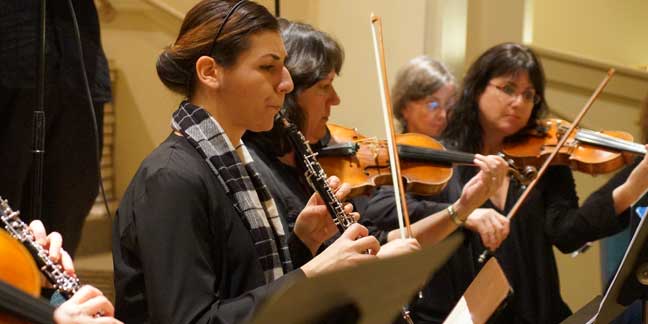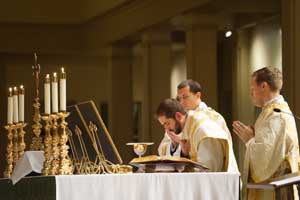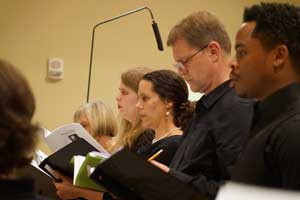 HUNTERSVILLE — Brendan Keane has stepped down as principal at Christ the King High School, and Assistant Principal Michael Smith has been named interim principal for the remainder of this academic year.
HUNTERSVILLE — Brendan Keane has stepped down as principal at Christ the King High School, and Assistant Principal Michael Smith has been named interim principal for the remainder of this academic year.
Keane had served as principal of the Huntersville school since June 2014.
Citing the desire to spend more time with his family, Keane left to start a new job Jan. 23 as co-director of the Eagle Impact Rugby Academy in North Carolina. He had already worked with EIRA as a regional coach for the Carolinas since 2013, and as an U16s head coach in 2015 and as an U17s head coach in 2016.
"After much thought and prayer, and with regret, I have decided to step down as the principal of Christ the King Catholic High School at the end of the first semester," Keane told parents in a Jan. 10 letter.
"The past few years serving the community at CTK have been the highlight of my career in education. The parents, students, faculty, staff, and supporters of Christ the King are second to none in your endeavor to create a community pursuing an excellent and holistic educational experience for everyone involved. The willingness of each of you to try something new and step out on the edge to create not only a school, but also athletic teams, clubs, support organizations, plays, musicals and a myriad of other programs is inspiring and humbling. So too is the generosity with which members of the community give their time, talents, and treasure to support the school in its mission and growth. I will never be able to thank you enough for giving me the opportunity to get to know you, to see your passions, and to be part of the amazing work going on at CTK," he wrote.
Christ the King High School has about 230 students, making it the smallest of the Diocese of Charlotte's three high schools. It opened in a temporary location in Mooresville in 2011 and moved to its current 100-acre location just outside Huntersville in 2013 to serve the growing Catholic population north of Charlotte. The school graduated its first senior class in 2015.
The Diocese of Charlotte schools office aims to appoint a new principal before the start of the next academic year, Dr. Janice Ritter, superintendent, said.
"I am confident we will find a leader who can build on the great foundation which has been laid these past few years," Ritter wrote in a letter to parents. "I know Mr. Keane takes with him the good wishes of the CTK stakeholders, and likewise Mr. Smith will have the support of those same stakeholders. I am confident the students, staff and parents of CTK will continue to be the strong community it has shown itself to be and will work together during this transition."
— Catholic News Herald
 HUNTERSVILLE — St. Mark Church offered a special Solemn High Orchestral Latin Mass with the Carolina Catholic Chorale Jan. 15.
HUNTERSVILLE — St. Mark Church offered a special Solemn High Orchestral Latin Mass with the Carolina Catholic Chorale Jan. 15.
The Mass was originally scheduled for Jan. 8, the Feast of the Holy Family on the Extraordinary Form calendar, but the liturgy was rescheduled due to inclement weather.
Nearly 600 people attended this first Solemn Latin Mass at the parish, which featured the chorale providing music from Antonio Caldara’s “Mass in A Major” as well as several pieces from Mozart.
Father Joseph Matlak, pastor of St. Basil the Great Ukrainian Rite Mission in Charlotte, offered the Mass with Father Jason Barone from St. Ann Church as deacon and Father Jason Christian from St. Thomas Aquinas Church as subdeacon.
The Huntersville parish plans to offer more Latin Masses on Fridays during Lent.
— Photos by John Cosmas and Mike FitzGerald | Catholic News Herald


 CHARLOTTE — Dr. Cris Villapando, diocesan director of faith formation programs, was honored for giving 20 years of service to the Diocese of Charlotte and 45 years of service overall to the Church as he retired this month.
CHARLOTTE — Dr. Cris Villapando, diocesan director of faith formation programs, was honored for giving 20 years of service to the Diocese of Charlotte and 45 years of service overall to the Church as he retired this month.
During his tenure, Villapando has worked with clergy, parishioners, catechists, vicariate personnel and parish catechetical program leaders in guiding the diocese’s overall faith formation efforts, including youth faith formation and RCIA programs.
Among other accomplishments, Villapando crafted the diocese’s confirmation guidelines as well as a home catechesis policy, he established a recognition process for catechists, and he developed a handbook and training programs for parish catechetical program leaders. He also formed the diocesan Commission on the RCIA and oversaw the process and Rites of Election each year across the diocese. He also offered catechetical outreach to the growing Latino, Filipino, Vietnamese and Korean Catholic communities.
Before coming to Charlotte, Villapando also served in the dioceses of Richmond and Dallas, the Archdiocese of Denver, and at the University of Dallas.
Pictured: During his retirement celebration Jan. 12, Dr. Cris Villapando and his wife receive a blessing from Bishop Peter Jugis as Bishop Emeritus William Curlin joins them in prayer. Villapando also received an award (below) for his 20-plus years of service to the Diocese of Charlotte. (Photos by Patricia L. Guilfoyle | Catholic News Herald)
“We will miss your presence but will count on your sage advice and friendship,” said Father Roger Arnsparger, diocesan vicar of education, during a reception and award presentation Jan. 12 at the Diocesan Pastoral Center. “You may retire from the office, but we will still count on your prayer and counsel.”
Bishop Peter Jugis prayed a blessing over Villapando and his wife, thanking him for his dedication in bringing people closer to Christ.
“May Almighty God keep you from all harm and bless you with every good gift. May He set His word in your heart and fill you with lasting joy. May you walk in His ways, always knowing what is right and good until you enter into your heavenly inheritance,” he prayed.
In brief remarks, Bishop Jugis noted Villapando has interacted with and inspired “literally thousands” of people over the years.
“On their behalf I wish to thank you for your dedication to them, helping to form them in parish formation teams and parish formation programs, and for the other great work that you have done. That legacy is what we continue to build on” as the diocese continues to grow and deepen in faith, he said.
Bishop Emeritus William Curlin noted the growth of the Charlotte diocese has been “because of the goodness of people like you, with your wonderful gifts and your dedication and your great heart.”
“Continue to use your gifts,” he told Villapando. “You don’t retire from being Christ-like, you just have a new dimension in how you spend your life and how you enrich others’ lives.”
Villapando thanked all those who have worked with him over the years, especially his colleagues in the Education Vicariate, noting that his mission in education and evangelization has been about changing hearts and bringing people closer to Christ.
“You are all incarnated grace for me,” he said. “Thank you.”
— Patricia L. Guilfoyle, Editor
 BELMONT — Surrounded by a small group of Sisters, Mercy Sister Mary Bernarda Hoff died peacefully on Friday, Jan. 27, 2017, at Marian Center in Belmont after a lengthy illness. Sister Bernarda was a Sister of Mercy for 71 years and would have celebrated her 92nd birthday on Feb. 1.
BELMONT — Surrounded by a small group of Sisters, Mercy Sister Mary Bernarda Hoff died peacefully on Friday, Jan. 27, 2017, at Marian Center in Belmont after a lengthy illness. Sister Bernarda was a Sister of Mercy for 71 years and would have celebrated her 92nd birthday on Feb. 1.
A Mass of Christian Burial will be celebrated at 11 a.m. Tuesday, Jan. 31, 2017, at Cardinal Gibbons Chapel in Sacred Heart Convent, Belmont. Interment will follow at Belmont Abbey Cemetery.
Peggy Eva Hoff was born in Greensboro on Feb. 1, 1925, the daughter of Leon Calvin Hoff Sr., and Lucille Estell Garrett, also of Greensboro.
In 1942 she graduated from Greensboro High School and entered the nursing school at St. Leo’s Hospital, obtaining her R.N. degree in 1945. She later also earned a bachelor’s degree in psychology from Sacred Heart College in Belmont, but her lifelong ministry was in the healthcare profession.
On Sept. 1, 1946, she entered the Sisters of Mercy in Belmont, taking the name Sister Mary Bernarda a year later. She professed perpetual vows on Aug. 16, 1952, and began her ministry at St. Joseph’s Hospital (later Mission/St. Joseph) in Asheville, where she served until 2001 – nearly 50 years in service to the people of the Asheville area.
Sister Bernarda retired from the hospital to Sacred Heart Convent in Belmont in 2001 but continued volunteer work, particularly at Catherine’s House, a shelter for women in transition, until she could no longer serve in active ministry.
Sister Bernarda leaves behind wonderful memories of her complete commitment to mercy, and of her exceptional talent as a dancer – everything from ballet to ballroom dancing and clogging.
Long ago she chose “Domine, non sum dignus” ("Lord, I am not worthy") as the motto in her ring. On Jan. 27, God said, "You are indeed worthy. Come home." And she did!
Memorials to the Sisters of Mercy may be made in Sister Mary Bernarda's honor and sent to 101 Mercy Drive, Belmont, NC 28012.
McLean Funeral Directors of Gastonia was in charge of the arrangements.
— Catholic News Herald
 ROME — First Year students at the Pontifical North American College, including Jacob Mlakar, received the Ministry of Lector Jan. 15.
ROME — First Year students at the Pontifical North American College, including Jacob Mlakar, received the Ministry of Lector Jan. 15.
Mlakar, a seminarian from St. Matthew Church recently earned a Bachelor of Philosophy from the Pontifical College Josephinum in Columbus, Ohio, indicating successful completion of the pre-theology program.
Lector is the first of those ministries given to seminarians in their journey to priestly ordination and allows them to proclaim the readings at Holy Mass.
Bishop Paul Tighe of the Pontifical Council for Culture was the main celebrant of the Mass. Cardinal James Harvey and members of the faculty con-celebrated. During the rite, Bishop Tighe presented each candidate with the Lectionary and instructed them “Take this book of Holy Scripture and be faithful in handing on the word of God, so that it may grow strong in the hearts of his people.”
— Photo provided by the Pontifical North American College,

